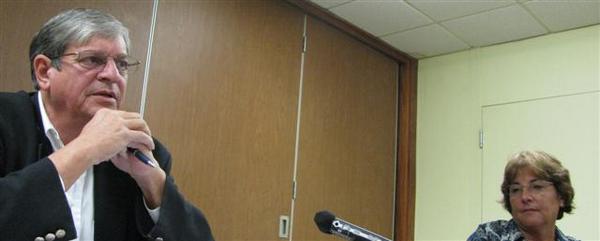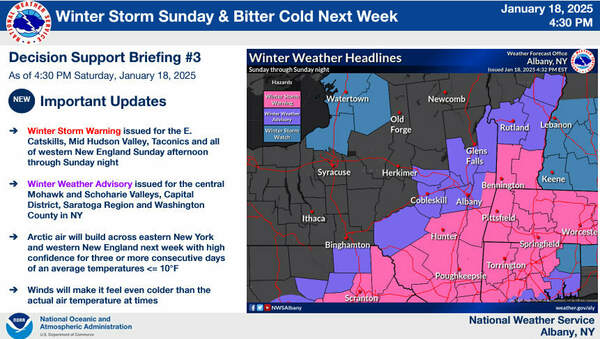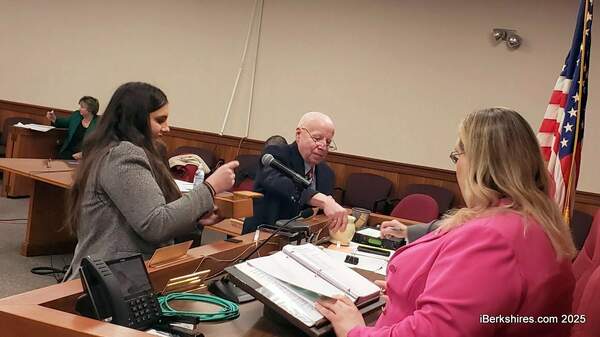
Barrett Challenges Unions on GIC, Insurance Trust
 Mayor John Barrett III goes over figures he says proves the city's insurance fund is being properly run. |
But will they take it?
Barrett on Tuesday said he'd provided the city's union leadership with a memorandum of agreement to join the state's Group Insurance Commission.
"We're going to recommend they take it back to their membership for a vote," said Barrett in a press meeting at City Hall, with the caveat: "It is bad for the employees, it is not that great for the city because the city will lose control of future costs and, in the end I believe it will cost the city hundreds of thousands of dollars more three or four years down the road."
It was less an acquiescence than a challenge from the outgoing mayor: Barrett thinks if the union leadership explains that co-pays and deductibles will go up for more than 300 workers, and that the 150 or so retirees will lose their Blue Cross Medex coverage, the membership won't be that quick to jump on board by the Dec. 1 deadline.
"My bet is they won't accept it."
The mayor and the unions have been butting heads over health insurance for more than a year, after the city's seven public employee unions pushed to join the GIC, which was opened to municipalities and school districts through the Municipal Partnership Act. More recently, the teachers, firefighters and police unions have accused the city of overcharging contracted premium rates by underfunding the medical trust fund of the city's self-insurance plans.
The insurance battle became an issue in the mayoral race this year, though only lightly touched on by Barrett and challenger Richard Alcombright. But online, the charges and countercharges flew, with some claiming that the veteran mayor had pocketed upwards of $2 million — if he hadn't shuffled it into other city accounts.
The day after Alcombright won, ending Barrett's record 26 years in the corner office, the teachers' union presented documents to the School Committee they say showed members had been paying 33 percent on average of the past five years. The School Committee halted questions and continued the grievance hearing to provide time to go over the numbers.
Barrett, chairman of the School Committee, wasn't there that night but offered his own figures from the self-insurance account on Tuesday, along with Nancy Ziter, business manager and acting treasurer, to refute "the malarky" that's been going on.
It's not the city that's been leaving the trust fund short, it's the employees, said Barrett. "If you go by their calculations."
According to the work sheet provided by Barrett and Ziter, the city has paid out more than its share in four of the last seven years.
In self-insurance, an entity sets rates each year based on historical and estimated costs; the entity is then responsible for meeting payment obligations for current bills and anticipated bills received after the end of the fiscal year (called the runout). Sometimes the costs come in below estimates, sometimes over.
In 2009, the city paid an extra $39,000. There's a discrepancy of about $150,000 for the current year for bills not yet paid; a far cry from $2 million, said Barrett.
 |
"What we're responsible for more than anything else is the paying of the bills, which we've done each and every year," said Barrett. "The medical insurance trust has never been in trouble, even during the [Richard] Lamb administration when it was started, and it's been run by the treasurers for over 26 years."
If their there was hanky panky going on, why haven't the attorney general or district attorney looked into it? he asked. Why didn't it picked up in yearly audits?
(The figures provided the city, which were also given to the unions, don't match with those used by the teachers' union. The unions' numbers are based on enrollment multiplied by rates; the city's appear to be on total costs.)
Barrett conceded the unions' accusations may have played a role in his defeat, but said trying to explain the insurance factor would have been difficult and defensive. Plus the matter was in mediation.
"I wanted to run a campaign based on trust, 26 years of trust and accomplishments," he said adding, "I did not explain this because you can't explain to people who don't want to listen."















